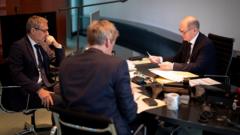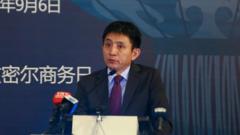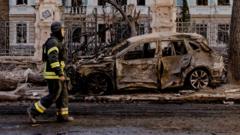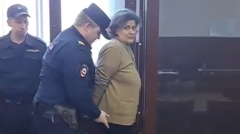In a rare conversation, German Chancellor Olaf Scholz condemned Russia’s use of North Korean military support against Ukraine as a severe escalation. The dialogue focused on the necessity for negotiations and a stable peace while underscoring Germany's unwavering support for Ukraine amidst mounting political pressure domestically.
Scholz Confronts Putin on North Korean Deployment in Ukraine

Scholz Confronts Putin on North Korean Deployment in Ukraine
Chancellor Olaf Scholz articulates concerns over North Korean troops in Ukraine, calling for an end to the conflict in a significant phone call with President Vladimir Putin.
In a significant diplomatic exchange, German Chancellor Olaf Scholz urged Russian President Vladimir Putin to withdraw troops from Ukraine, condemning the deployment of North Korean forces in the region as a "grave escalation." This phone call, hailed as the first between the leaders since December 2022, marked a critical moment amidst the ongoing conflict. Scholz expressed Germany's strong commitment to Ukraine's defense and reiterated calls for peace negotiations.
Putin's office termed the conversation a "detailed and frank exchange" regarding the situation in Ukraine, highlighting that maintaining dialogue is a positive step. However, Ukrainian President Volodymyr Zelensky criticized the engagement, labeling it a “Pandora’s box” that could weaken international isolation of the Kremlin.
Throughout the hour-long conversation, Scholz condemned Russian military actions against civilians and emphasized the need for a "fair and lasting peace." His administration remains wary of perceptions that Berlin may be negotiating settlements without Kyiv's involvement, given troubling historical precedents from the 20th century.
Prior to speaking with Putin, Scholz consulted with Zelensky, setting a collaborative tone for discussions around the war. The Kremlin's narrative claims that the deterioration in Russian-German relations resulted from Berlin’s purportedly “unfriendly” policies. Putin asserted that any peace initiative would have to acknowledge the “new territorial realities,” referring to Russian-occupied regions in Ukraine since 2022.
Scholz has conveyed an ongoing effort to foster dialogue through discussions with world leaders, including a plan to engage with Chinese President Xi Jinping concerning the Russia-Ukraine situation at the upcoming G20 summit.
This latest exchange aligns with Scholz's broader goal of promoting peace amid political challenges in Germany, where his government faces growing electoral pressure as far-right and left parties demand intensified efforts for a resolution to the conflict. The war has deeply affected Germany politically and economically, heightening the urgency for Scholz to demonstrate progress towards peace before the elections slated for February.
In the wake of Russia’s full-scale invasion in February 2022, Germany has emerged as a leading supporter of Ukraine. Nonetheless, falling approval ratings complicate the Chancellor's position, as the nation grapples with the war's repercussions. Scholz's latest communication with Putin could be pivotal in reshaping his political landscape ahead of crucial votes in the coming months.






















